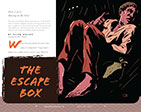When Samuel Smith heard of the
plan, he objected. “I just don’t think you could survive such a trip. What if
the box gets turned upside down? What if you get thrown about and hit your
head?” But Henry was determined, and Samuel eventually agreed to the plan.
Henry had thought it through, and he dictated the dimensions of the box: three
feet one inch by two feet six inches by two feet. Again Samuel objected.
“That’s a mighty small space. Even
if you manage to survive, you’re going to be uncomfortable.”
“But if the box is too big, someone
might get suspicious,” Henry countered. “We have to make it believable.” So
they found a carpenter to make the box.
“You need to get a few days off
work,” Samuel advised. “That way, you can be in Philadelphia before anyone
realizes you’re gone.”
Henry had an infected finger, so he
showed that to the overseer and asked for time off.
“That’s nothing!” declared the
overseer. “Don’t be such a baby.”
So Henry went home after work to
apply sulfuric acid to the infected spot to make it a little worse. Except that
he was so nervous that he spilled it. “Yee-owch!” he yelled as the acid washed
over his finger, eating away the flesh to the bone. After that, he had no
trouble getting time off work.
Samuel contacted an abolitionist
friend in Philadelphia, Pennsylvania, to take delivery of the box, and the
three conspirators met at Samuel’s store at 4:00 a.m. one day in March of 1849.
Henry bored holes into the box for air. He then climbed carefully into the
small container, taking the little drilling tool with him in case he would need
to bore more holes. He also took a few biscuits and a beef bladder filled with
water. James and Samuel wished him well, then nailed the box shut and wrote:
“THIS SIDE UP—HANDLE WITH CARE.”
When the dray wagon arrived, James
and Samuel loaded the box carefully and watched, hardly daring to breathe, as
the Belgian “great horses” started off in the direction of the express office.
Undoubtedly they prayed, and it was
a good thing, for when Henry’s box arrived at the express office, it was
immediately loaded onto another wagon upside down. Henry braced his arms to
support his head and neck.
Upon arrival at the train station,
the box was tossed roughly into the baggage car. So much for the instructions
written on it. Fortunately, this time Henry landed on his side. At Potomac
Creek the box was transferred to a steamer —upside down again. For an hour and a
half, which seemed like an eternity, Henry remained in this position while the
blood rushed to his head, distending the veins in his temples and making his
eyes swell.
“God,” he prayed, “I do not believe
You have brought me this far to let me die. Save me, I pray!” Then, remembering
the Hebrew youths in the fiery furnace, he added, “I submit myself to Your
will, O Lord.” Just then he heard two men talking nearby.
“I’ve been standing for two hours,”
said one. “I’d give my eyeteeth for something to sit on. I say, look at that
box over there! Help me turn it on its side, and we can both sit down.” This
they did, and Henry breathed a prayer of thanksgiving.
What d’you suppose is in this box?”
asked the second man.
“I guess it’s the mail,” said the
first man.
Yes, thought Henry, it’s the male, but
not the mail you’re thinking of!
From time to time he drank from the
bladder, and squeezing water over his face seemed to help him breathe a little
better. At the depot in Washington, the driver of the wagon that had brought
him from the train called to the depot workers.
“I need someone to help me unload
this box.”
“Just throw it off,” came the reply
from the loading dock.
“But it says ‘This side up—handle
with care,’” protested the driver. “There might be fine dishes in it. If I
throw it, I might break something.”
“Don’t matter if you break
everything in it” was the careless reply. “The railway company can afford to
pay for it.” In the next instant Henry felt the box tumbling from the wagon. It
hit the dock so hard, he was knocked unconscious. When he came to, the first
words he heard were fearful ones.
“No room for this box,” said a
voice, “It’ll have to go tomorrow on the luggage train.”
Oh, no! I just can’t endure another
day in this cramped container! He thought. Once again, Henry turned to God in
prayer, and a moment later another voice asserted, “Nope. Can’t do that. This
box came express; it has to be sent on.” And the box was tumbled onto the
train, upside down again. Moments later, however, as the luggage was shifted
around, the box was turned onto its side, and he rode that way to Philadelphia.
There he waited until 7:00 p.m., when a wagon came to pick the box up.
At last, after 27 hours of closed
confinement, Henry arrived in his box at the antislavery office. Several
prominent abolitionists were waiting nervously, not at all sure what they would
find when they opened the box. Fearfully, J. M. McKim rapped on the lid. “All
right?” he called.
“All right, sir!” came the instant
reply. Quickly, with saw and hatchet, the abolitionists removed the lid and
assisted Henry out of the box. After such long confinement in such a cramped
position, it was a little while before he could stand on his own.
Henry had chosen Psalm 40 to
celebrate this moment, and the room fell silent as he sang fervently, “‘I
waited patiently for the Lord; and He heard . . . my prayer’” (KJV).

